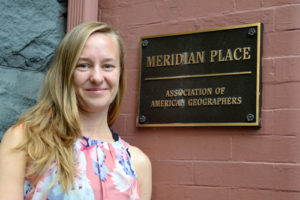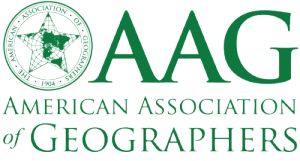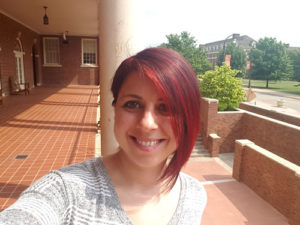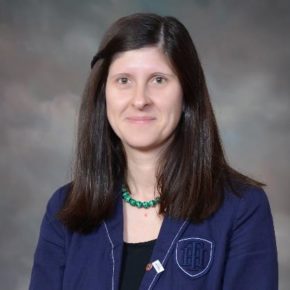 The National Center for Research in Geography Education (NCRGE), a research consortium headquartered at the American Association of Geographers (AAG) and Texas State University, has approved awards for three new projects under its Transformative Research grant program. This investment by NCRGE continues a long-term and broad-based effort to develop a research coordination network supporting implementation of the Road Map for 21st Century Geography Education project’s landmark report on geography education research.
The National Center for Research in Geography Education (NCRGE), a research consortium headquartered at the American Association of Geographers (AAG) and Texas State University, has approved awards for three new projects under its Transformative Research grant program. This investment by NCRGE continues a long-term and broad-based effort to develop a research coordination network supporting implementation of the Road Map for 21st Century Geography Education project’s landmark report on geography education research.
NCRGE funds networking activities to strengthen geography education research processes and promote the growth of sustainable, and potentially transformative, lines of research. Through this program, NCRGE is building capacity for research in areas that the Road Map Project determined to be highly significant for achieving broad-scale improvements in geography teaching and learning.
Last year, NCRGE funded three research groups in the areas of geography learning progressions, geospatially-enabled project-based learning, and spatial thinking assessment. These groups recently completed their networking activities and are currently preparing research proposals to build upon their foundational work.
The second cohort of Transformative Research grantees will begin their research planning and networking activities in July 2017. One research group, under the direction of Jung Eun Hong (University of West Georgia) and Injeong Jo (Texas State University), will work to develop a conceptual model of pedagogical content knowledge (PCK) for geography teachers. PCK refers to the ability of teachers to represent specialized types of knowledge so that it is understandable by students. An early prototype of the PCK model will be tested empirically through case studies with five expert geography teachers. Classroom observations, lesson recordings, teacher interviews, teachers’ lesson plans and reflections, and student work samples will be compiled and analyzed quantitatively and qualitatively. The findings will inform the revision of the conceptual PCK model, which the group then plans to share with other researchers through the NCRGE research clearinghouse. This process will expand empirical testing of the model and provide new opportunities for expanding research into the characteristics of effective geography teaching and ways of enhancing the preparation of effective geography teachers.
A second group, to be led by Katsuhiko Oda (University of Southern California), will focus on a closely-related concept known as Technological Pedagogical Content Knowledge (TPACK), which deals specifically with teachers’ self-efficacy for incorporating technology into their instruction. The group will explore the value of TPACK for organizing coherent professional development experiences for teachers seeking to use geospatial technology in different subject areas. Through a series of sessions with middle school teachers, the group will collect and analyze reflective journals, lesson plans, and classroom demonstrations to identify the components of a TPACK model for geospatial technology. Once their provisional TPACK model becomes available in the NCRGE research clearinghouse, the group will invite others to join the network for further empirical studies in a larger number of sites.
Jamie Winders and Anne Mosher (Syracuse University) will initiate a group to explore where, when, and how student services professionals recommend pathways to college and careers for students who express an interest in geography. The group will organize focus groups and interviews with high school guidance counselors, college admissions representatives, and college general advising staff in three different states to identify difficulties that students, particularly young women and other underrepresented groups, face in continuing their studies of geography in college. By opening a line of research focused on non-instructional personnel, this group hopes to develop a new collaborative methodology for investigating the information provided to students on choices of college to attend, careers to target, specific courses to take, and majors to declare. Having such information is critical to implementing strategies aimed at escorting a more diverse and inclusive flow of students from high school to college.
The second cohort of NCRGE Transformative Research grantees will present the results of their projects in a special symposium being planned for the 2018 AAG Annual Meeting in New Orleans. This symposium will be an all-day event featuring keynote speakers, paper and panel sessions, and grant-writing workshops for geography education research.
The NCRGE research coordination network is supported by a grant from the National Science Foundation’s Geography and Spatial Science program (NSF Award BCS-1560862). For more information, please visit www.ncrge.org.

 The American Association of Geographers is deeply saddened and disturbed by the recent deadly and violent events in Charlottesville, Virginia.
The American Association of Geographers is deeply saddened and disturbed by the recent deadly and violent events in Charlottesville, Virginia. The AAG welcomes Emily Fekete in the new position of Communications, Education, and Media specialist. Prior to the AAG, she was employed as a clinical assistant professor and undergraduate coordinator for the geography department at Oklahoma State University. While at the university, she taught courses in cultural geography, economic geography, and geographies of new media as well as served as the undergraduate advisor and coordinator of the undergraduate geography, geospatial information science, and global studies programs.
The AAG welcomes Emily Fekete in the new position of Communications, Education, and Media specialist. Prior to the AAG, she was employed as a clinical assistant professor and undergraduate coordinator for the geography department at Oklahoma State University. While at the university, she taught courses in cultural geography, economic geography, and geographies of new media as well as served as the undergraduate advisor and coordinator of the undergraduate geography, geospatial information science, and global studies programs. The United States Geospatial Intelligence Foundation (USGIF) has appointed Camelia Kantor as its new Director of Academic Program. In this position, she will manage USGIF’s Collegiate GEOINT Accreditation Program, which awards students GEOINT Certificates accompanying their college degrees. Kantor was formerly an associate professor of geography at Claflin University in South Carolina. Most recently, she has served as a GeoMentor. Kantor is the recipient of AAG’s 2017 Dr. Helen Ruth Aspaas SAGE Innovator Award. The award is named for one of the founding members of the SAGE (Stand-Alone Geographers) Specialty Group, Dr. Helen Ruth Aspaas, a retired professor from Virginia Commonwealth University, and recognizes an outstanding and innovative Stand Alone Geographic Educator. To learn more, visit
The United States Geospatial Intelligence Foundation (USGIF) has appointed Camelia Kantor as its new Director of Academic Program. In this position, she will manage USGIF’s Collegiate GEOINT Accreditation Program, which awards students GEOINT Certificates accompanying their college degrees. Kantor was formerly an associate professor of geography at Claflin University in South Carolina. Most recently, she has served as a GeoMentor. Kantor is the recipient of AAG’s 2017 Dr. Helen Ruth Aspaas SAGE Innovator Award. The award is named for one of the founding members of the SAGE (Stand-Alone Geographers) Specialty Group, Dr. Helen Ruth Aspaas, a retired professor from Virginia Commonwealth University, and recognizes an outstanding and innovative Stand Alone Geographic Educator. To learn more, visit  The National Center for Research in Geography Education (NCRGE), a research consortium headquartered at the American Association of Geographers (AAG) and Texas State University, has approved awards for three new projects under its Transformative Research grant program. This investment by NCRGE continues a long-term and broad-based effort to develop a research coordination network supporting implementation of the Road Map for 21st Century Geography Education project’s landmark report on geography education research.
The National Center for Research in Geography Education (NCRGE), a research consortium headquartered at the American Association of Geographers (AAG) and Texas State University, has approved awards for three new projects under its Transformative Research grant program. This investment by NCRGE continues a long-term and broad-based effort to develop a research coordination network supporting implementation of the Road Map for 21st Century Geography Education project’s landmark report on geography education research.